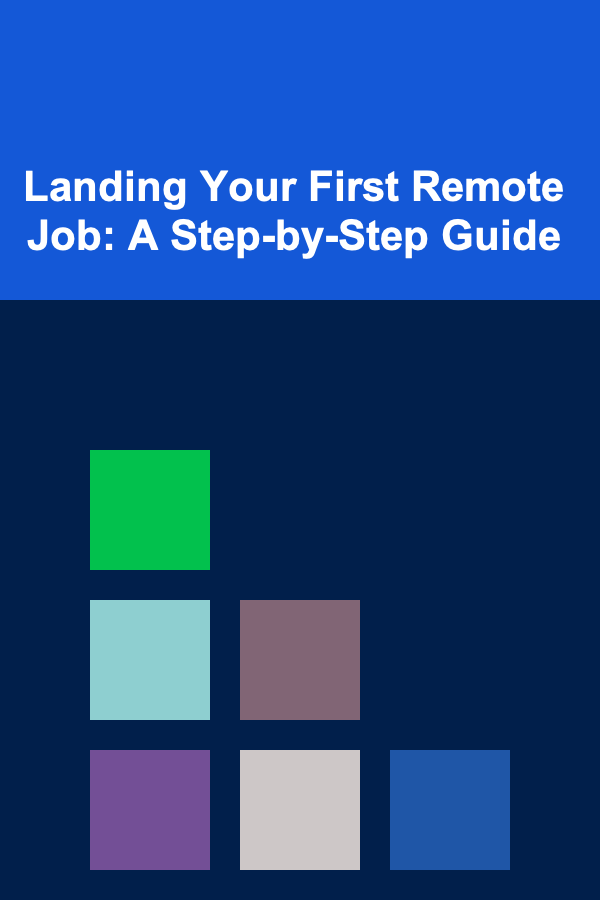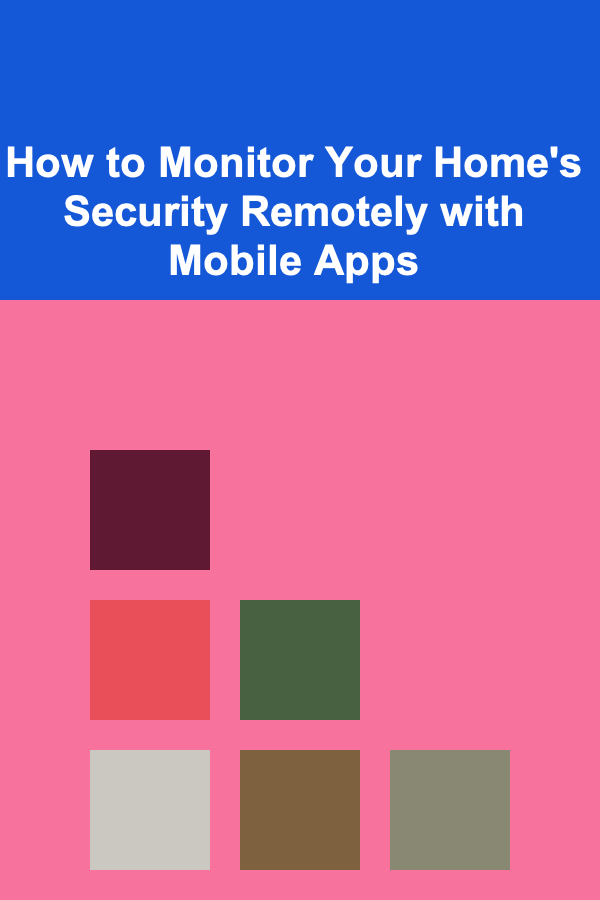
Landing Your First Remote Job: A Step-by-Step Guide
ebook include PDF & Audio bundle (Micro Guide)
$12.99$11.99
Limited Time Offer! Order within the next:

In today's fast-paced world, remote work has evolved from a niche option to a mainstream career choice. Whether you're a recent graduate, an experienced professional, or someone looking to switch fields, landing your first remote job can be an exciting, albeit challenging, journey. With the rise of flexible work arrangements, the market is full of opportunities. However, standing out among the pool of candidates requires strategy, preparation, and the right mindset.
This guide will take you through a step-by-step process to help you successfully land your first remote job.
Step 1: Understand the Remote Work Landscape
Before diving into the job hunt, it's crucial to understand the remote work landscape and how it fits into your lifestyle. Remote work is not a one-size-fits-all solution, so it's essential to know whether this type of work is right for you.
Key Aspects of Remote Work:
- Flexibility: Remote jobs often offer flexibility in terms of hours and location, but some jobs may require strict working hours (especially if the company is located in a different time zone).
- Communication Tools: Remote work relies heavily on communication tools like Slack, Zoom, Microsoft Teams, and email. Comfort with these platforms is essential.
- Self-Discipline: Unlike traditional office settings, remote work demands a high level of self-motivation and time management.
- Isolation: While remote work offers independence, it can also lead to feelings of isolation. Ensuring you can stay connected to a team and maintain social interaction is key.
Step 2: Identify the Right Remote Job for You
Once you have a clear understanding of remote work, the next step is identifying which type of remote job aligns with your skills, interests, and career goals.
Common Remote Job Roles:
- Customer Support Representative: Companies across industries hire remote customer support agents to provide assistance via phone, email, or chat.
- Freelance Writer/Editor: Content creation is one of the most common remote job roles, particularly for writers, editors, and content strategists.
- Software Developer: Software engineers and web developers are in high demand for remote roles, as their work often requires minimal face-to-face interaction.
- Virtual Assistant: Virtual assistants handle administrative tasks for entrepreneurs and small businesses, often performing duties like email management, scheduling, and customer service.
- Digital Marketing Specialist: From social media management to SEO and paid ads, digital marketing professionals can work remotely, helping businesses boost their online presence.
If you're unsure about which remote job suits you, spend some time researching and reflecting on your strengths, career aspirations, and interests. If you're switching fields, it's helpful to take online courses or certification programs to bridge any knowledge gaps.
Step 3: Update and Tailor Your Resume for Remote Jobs
Your resume is your first introduction to a potential employer, so it's essential to make it shine. When applying for remote jobs, your resume should highlight skills and experiences that are relevant to the remote work environment.
Tips for Crafting a Remote-Friendly Resume:
- Highlight Remote Experience: If you've worked remotely before, make sure to showcase that experience. Even if you haven't, mention any remote collaboration or communication tools you've used in past roles.
- Focus on Results: Remote employers care about results, so be sure to quantify your achievements. Use numbers to demonstrate how your work has positively impacted past employers (e.g., increased sales, improved customer satisfaction, etc.).
- Showcase Remote-Specific Skills : Emphasize skills that are especially important for remote work, such as:
- Time management
- Independent problem solving
- Communication
- Proficiency in remote tools (Slack, Zoom, Asana, etc.)
- Self-motivation
Make sure your resume is tailored for each job you apply to, highlighting the most relevant skills for each specific role.
Step 4: Build an Online Presence
In addition to a polished resume, building a strong online presence is crucial when applying for remote jobs. Employers want to see that you're not only capable of doing the work but that you're also proactive, professional, and capable of representing their brand online.
Key Elements of an Online Presence:
- LinkedIn: Update your LinkedIn profile with relevant experiences, skills, and accomplishments. Actively engage in groups and follow companies you're interested in. LinkedIn is also a great platform for networking, which can lead to job opportunities.
- Portfolio: For creative fields like writing, design, and marketing, a portfolio can be a powerful tool. Use platforms like Behance, Dribbble, or a personal website to showcase your work.
- GitHub: If you're a developer, a GitHub profile is a must. Employers will want to see your code quality and commitment to ongoing learning.
Be mindful of your online reputation; hiring managers may search for you online to assess your professional background. Ensure your profiles reflect your qualifications and professionalism.
Step 5: Search for Remote Jobs on the Right Platforms
Now that you're well-prepared with a tailored resume and online presence, it's time to start looking for remote job opportunities. Numerous job boards specialize in remote work listings, so focus on platforms that align with your skills and the type of remote job you're seeking.
Popular Remote Job Platforms:
- We Work Remotely: One of the largest remote work job boards, with listings across various industries.
- Remote.co: A comprehensive resource for remote job seekers, offering job listings, company profiles, and advice on remote work.
- FlexJobs: A paid platform that provides curated remote job listings and offers screening to ensure job opportunities are legitimate.
- AngelList: Great for finding remote opportunities at startups, particularly in tech and marketing fields.
- LinkedIn: Not just for networking, LinkedIn also offers a wealth of remote job listings.
- Indeed: Searching for remote positions on traditional job boards like Indeed is also a viable option, especially for entry-level positions.
Use filters to narrow down your search to remote positions, and set up job alerts to be notified when new opportunities arise.
Step 6: Tailor Your Application for Each Job
It's tempting to send out the same generic application to multiple remote job listings, but this is unlikely to get you noticed. Instead, take the time to tailor your cover letter and resume to each specific job.
What to Include in Your Cover Letter:
- Why You Want the Job: Show enthusiasm and explain why you're specifically interested in this role and the company.
- Relevant Experience: Highlight the experiences and skills that make you the best candidate for the position.
- Remote Work Compatibility: Emphasize why you're a great fit for remote work, such as your ability to manage time effectively, work independently, and communicate efficiently.
A personalized approach will not only demonstrate your genuine interest in the job but also show that you're willing to invest the effort to stand out.
Step 7: Prepare for Remote Interviews
If you've been invited for an interview, congratulations! But be aware that remote job interviews can differ from in-person ones, and preparation is key.
Tips for a Successful Remote Interview:
- Test Your Technology: Make sure your camera, microphone, and internet connection are working correctly before the interview. You don't want technical difficulties to be the first impression you make.
- Dress Professionally: While remote interviews offer the opportunity for a more casual appearance, always dress professionally to convey that you take the interview seriously.
- Prepare for Video-Based Questions: Many remote interviews take place via video conferencing platforms like Zoom or Skype. Be ready to answer questions while maintaining good eye contact and body language.
- Showcase Communication Skills: Since remote work relies heavily on digital communication, it's important to demonstrate your ability to articulate thoughts clearly, listen actively, and respond thoughtfully.
Step 8: Follow Up
After your interview, be sure to send a thank-you email. This small gesture can set you apart from other candidates and reaffirm your interest in the role.
Crafting a Thank-You Email:
- Express Gratitude: Thank the interviewer for their time and the opportunity to discuss the role.
- Recap Key Points: Briefly mention something specific from the interview that reinforced your interest in the position.
- Restate Your Fit: Reinforce why you're a great fit for the job and your excitement about the opportunity.
This follow-up step is especially important in a remote job application process, where communication can sometimes feel less personal.
Step 9: Stay Organized and Patient
Remote job hunting can take time, so staying organized and patient is crucial. Keep track of the jobs you've applied to, deadlines for follow-ups, and any feedback you receive. Use a spreadsheet or project management tool to keep things organized.
Remember, rejection is part of the process. If you don't land your first remote job immediately, don't be discouraged. Learn from each experience and continue applying.
Conclusion
Landing your first remote job is an exciting step that can open up a world of opportunities. By following this step-by-step guide, you'll be well on your way to finding a remote job that aligns with your skills and lifestyle. Focus on understanding the remote work environment, tailoring your application, preparing for interviews, and building a strong online presence.
Be persistent, stay organized, and embrace the journey --- your dream remote job is closer than you think.

How to Evaluate and Invest in Peer-to-Peer Lending Platforms
Read More
How to Monitor Your Home's Security Remotely with Mobile Apps
Read More
The Art of Synthesizing Information: Mastering Research Methods for Effective Decision Making in a Research Analyst Role
Read More
How To Master Platforming Challenges
Read More
How to Learn How to Learn: Metacognition for Skill Acquisition
Read More
10 Tips for a Pottery Glazing Checklist
Read MoreOther Products

How to Evaluate and Invest in Peer-to-Peer Lending Platforms
Read More
How to Monitor Your Home's Security Remotely with Mobile Apps
Read More
The Art of Synthesizing Information: Mastering Research Methods for Effective Decision Making in a Research Analyst Role
Read More
How To Master Platforming Challenges
Read More
How to Learn How to Learn: Metacognition for Skill Acquisition
Read More